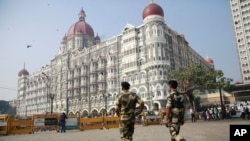The U.S. Treasury on Thursday imposed sanctions on three Pakistani nationals for suspected links with al-Qaida, Lashkar-e-Taiba and the Taliban.
Rahman Zeb Faqir Muhammad, Hizbullah Astam Khan and Dilawar Khan Nadir Khan were added to the Specially Designated Global Terrorists list for providing operational and financial assistance to “terrorists or acts of terrorism.”
“Treasury continues to aggressively pursue and expose radicals who support terrorist organizations and run illicit financial networks across South Asia,” Sigal Mandelker, undersecretary of the U.S Treasury for terrorism and financial intelligence, said Thursday.
“We are targeting operatives who have provided logistical support, improvised explosive devices and other technological assistance to al-Qaida, Lashkar-e Taiba, the Taliban and other terrorist groups,” Mandelker added.
The sanctions imposed by the assets control office bar U.S. companies and U.S nationals from conducting any business with the cited individuals. The designation also blocks the financial accounts and assets of the three individuals.
Law enforcement targets
The Treasury directive placed the three Pakistanis as high-profile targets for law enforcement worldwide.
The men are said to have served as close aides and confidants for a U.S.-designated international terrorist, Fazeel-A-Tul Shaykh Abu Mohammed Ameen Al-Peshawari, commonly known by the alias Sheikh Aminullah, who allegedly ran a recruitment and training center for many terrorist organizations such as al-Qaida, Lashkar-e-Taiba and the Taliban in Peshawar under the guise of a religious institution.
Rahman Zeb Faqir Muhammad reportedly provided financial, technical and logistical support to Lashkar-e-Taiba (LeT), a Pakistan-based U.S. and U.N.-designated terror group.
Lashkar-e-Taiba was founded by Hafiz Saeed in 1987 with the goal of liberating Indian-administered Kashmir and subsequently merging it with Pakistan. The group’s main focus had remained on Kashmir, but it also expanded its operations to neighboring Afghanistan.
Pakistan is accused of turning a blind eye to the activities of the group in the country since the group poses security threat to only India and Afghanistan, a charge Pakistan denies.
LeT is accused of being behind Mumbai's 2008 terror attacks in which 166 people were killed, including six Americans.
LeT Middle East
Rehman Zeb, Treasury said, ran a network for the LeT in the Middle East for many years in which he collected funds on behalf of the terror group and administered the group's financial operations in Afghanistan.
Rehman Zeb reportedly made travel arrangements for Sheikh Aminullah from Pakistan to the Gulf in 2014.
Hizbullah Astam Khan, usually referred to as Hizbullah, is suspected by U.S. authorities of being a longtime ally of Sheikh Aminullah and of helping Aminullah run the financial affairs of his Peshawar-based religious seminary since 2016.
Before joining the seminary in Peshawar, Hizbullah previously worked for Aminullah "as an improvised explosive device (IED) expert in Kunar province, Afghanistan, where he deployed IEDs targeting Afghan and coalition forces,” the Treasury statement said.
Dilawar Khan Nadir Khan is also said to be a close aide of Aminullah who worked as his assistant and took care of Aminullah’s activities inside and outside Pakistan, including Aminullah’s finances, accommodation and travel arrangements.
New sanctions
The new sanctions follow another set of sanctions imposed by the U.S. Treasury against six Taliban and Haqqani network militants. The series of sanctions are seen as part of the efforts to put more pressure on Pakistan to crack down on the terror financing network.
The recent U.S. sanctions came amid growing tensions between Washington and Islamabad. Washington blames Pakistan for tolerating terror safe havens on its soil and targeting terror groups selectively, overlooking those that carry out attacks in Afghanistan against Afghan and NATO forces in the country.
Pakistan denies the charges and maintains that it has carried out military operations against terror groups throughout the country indiscriminately and that there are no safe havens in the country.













